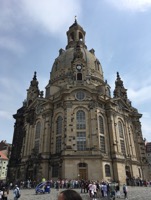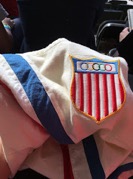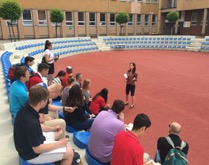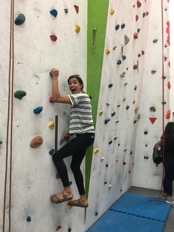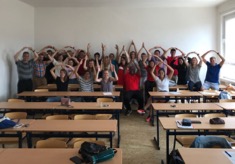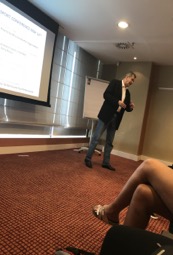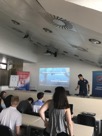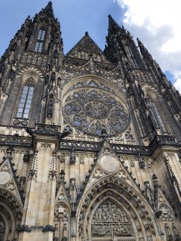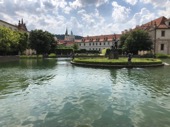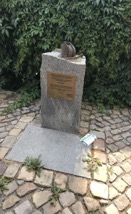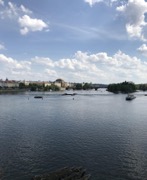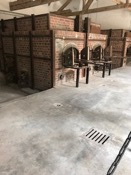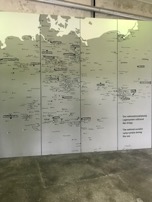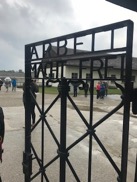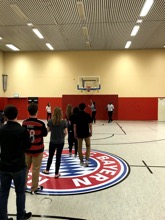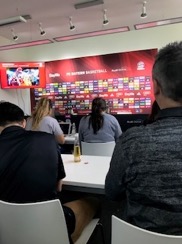by Lincoln Ficek and Josh Miller
The day began early as we had to leave the hotel at 8:45 am for lectures. As we exited the elevator, we couldn’t help but notice the aroma of waffles. We loaded our trays with the aforementioned waffles along with fruit, scrambled eggs, and juice. The hotel also had lunchmeats for breakfast, which we are still getting used to. We next boarded the bus for a short drive to the German Olympic Sports Confederation. Christian Sachs was the first lecturer. He discussed the sports legacy of the divided Germany and Olympic bids in Germany. His current position is Head of Sports at the Berlin Office of Sports.

He began his lecture by discussing the history of Germany after WWII. The Federal Republic of Germany was controlled by England, the United States, and France while the German Democratic Republic was ran by the Soviet Union. Political ideologies and emphasis on sport were not consistent. The German Democratic Republic used sport to gain international recognition. They sacrificed integrity for success, as doping was widespread. They did dominate the Federal Republic of Germany in terms of medal count. The GDR also focused on individual sports rather than team sports. Individuals could win multiple medals in sports such as swimming and track and field. Scouting to find future star athletes began at a young age. Doctors examined children to predict what sport they would be best at. While still a powerhouse, after its unification in 1989, Germany has not had as much Olympic success. They fare better in the Winter Olympics than the Summer Olympics, with luge and bobsled being major reasons.

We then went around the room and told Christian about ourselves and the topic of eSports arose. He said that they were trying to decide whether or not they, as an organization should focus on it. In the debate we talked about whether or not it should be a “sport”. Does the hand eye coordination and movement of hand make it enough of a physical activity? We also talked a little bit about the professional sport scene in eSports and how some of them are making more money than some actual athletes in lower leagues. Interestingly, Christian said that they used the term “sport” in the name so that they could market it to a larger audience. His explanation was that almost everyone in the world liked sports so giving video games this tag will make it grow even more.

Christian next discussed Olympic bids in Germany. Citizens of Olympic host city candidates Munich and Hamburg voted against applying for a bid. The cost of infrastructure is a big reason why. Lastly, Christian discussed the importance of sport clubs. They played a huge role in bringing the people of the now unified Germany together. The majority of funding for sports clubs is privately funded. Public funding does occur, but the clubs have total control on how to allocate the money. There are 91,000 clubs and 27 million members in Germany.
Ralf Iwan was the next lecturer. He discussed the ASPIRE experience. ASPIRE is a sport academy in Qatar. Before talking about the academy itself, he gave us some background information about Qatar. It is a steadily growing city with 240,000 Qatari nationals comprising the population. The emphasis on sport has also increased. The 2022 World Cup will be hosted there. Additionally, the city has hosted a wide variety of international sporting events including the 2006 Asia Games. Ralf next discussed ASPIRE, a boys only sport academy that includes a boarding school. It develops middle and high-school aged athletes in soccer, table tennis, sailing, track and field, and squash. It was the first sport academy in the Middle East. They expect their students to be competing in international championships. For well-roundedness, students play complementary sports.

A few of us broke off when we got dropped off in the downtown area to grab some lunch. We stopped at a place called Don Angelo’s, which was right under the TV tower in Berlin. The restaurant was Italian and had many different choices. We ended up keeping it simple and went with penne pasta with shrimp and red sauce. It was the right choice as we all agreed it was the best pasta we’d eaten in a while.

After lunch we had some downtime before visiting the refugee camp. None of us knew what to expect. We arrived at what appeared to be an abandoned school and hangar. We were then given a tour of the facility. The space was massive. Inside, there were basketball hoops, volleyball courts, ping pong tables, pool tables, foosball, a boxing ring, and a baseball field. Outside featured a basketball court and soccer field. We learned that it isn’t a refugee camp anymore. However, just a few years ago, it held over 2000 refugees. Today, most have found places to live. The facilities main purpose is to teach refugees social skills through sports. We were originally scheduled to play soccer with them. However, because it was Ramadan and most of the refugees are Muslim, there was only one to play with us. As all of us are current or former athletes, the games we played were very competitive. After the girls won a tightly contested soccer game, we moved inside to play volleyball. Here, the boys were able to get their revenge and win the volleyball series. It was much needed exercise for all of us. Sweating from playing sports rather than just being in the sun felt amazing.


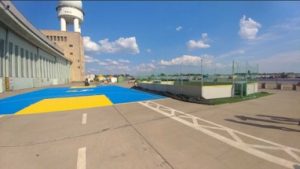
Tonight was the night of the trip where we had dinner as a big group in a fancy restaurant. We went to a place called Zur Gerichtslaube, which had authentic German cuisine. We had to order off of a group menu, but the choices were still amazing. Sjoerd treated us to drinks and a full three course meal. We started with a cream of potato soup with sausage and leek in it. For the main course we had a Berlin style meatball with mashed potatoes and sweet peas.

Finally, for desert we had a scrumptious little apple cake with whipped cream on the side. The dinner was a great way to talk with some new friends we have met on this trip, who hopefully we will continue to stay close with upon returning to Columbus.






